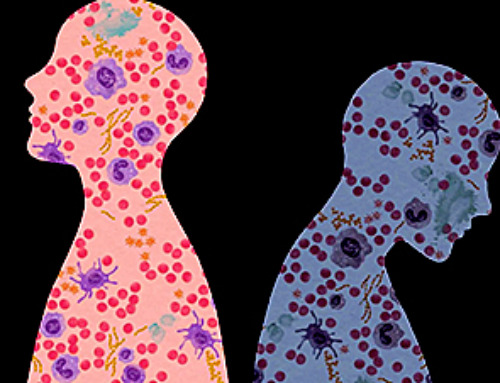The term 'tripledemic' has hit headlines this week as the NHS begins its Covid and fluvaccine roll-out for vulnerable adults.
As the cold weather sets in, many of us have experienced a decline in health, and this may be due to a trio of viruses that are currently circulating around the UK.
Older people, care home residents and people with health conditions are all eligible for vaccinations, with jabs set to be given from Thursday.
The latest roll-out comes after health officials raised concerns about a fall in the uptake of the flu vaccine after it emerged the illness had caused at least 18,000 deaths in the last two years.
But what is a 'tripledemic'? And how can we protect ourselves against the nasty winter viruses that are doing the rounds?
What is a 'tripledemic'?
"A 'tripledemic' refers to side-by-side outbreaks of three respiratory illnesses, typically occurring during the autumn and winter seasons," explains Dr Chun Tang, a GP at Pall Mall. "In recent years, it's been used to describe the simultaneous spread of Covid-19, influenza (flu), and respiratory syncytial virus (RSV).
"Each of these viruses can cause severe illness, especially in vulnerable groups like the elderly, young children, and those with weakened immune systems."
"It is of particular concern now because, as these viruses circulate together, they can put pressure on the NHS due to a greater influx of patients," says Tang.
Do RSV, flu and Covid-19 have similar symptoms?
"RSV, flu, and Covid share many overlapping symptoms like fever, cough, runny nose, and fatigue, which can make it difficult to tell the difference between them," notes Tang.
However, some are some key differences to look out for.
"Covid-19 may lead to a loss of taste or smell and more frequent breathing difficulties," highlights Tang. "RSV often causes wheezing and is more likely to affect infants, while the flu tends to hit quickly with sudden fever and body aches.
"If you're unsure, testing can confirm which virus is responsible."
Tang urges anyone whose symptoms become severe or worsen over time to contact their local GP, especially if you have trouble breathing, persistent high fever, confusion, or chest pain.
"For infants, seek medical attention if they are struggling to breathe, are dehydrated, or if the child becomes unusually lethargic," he adds.
Is it possible to get all three viruses at the same time?
"Yes, it's possible to contract more than one of these viruses together," warns Tang. "Being infected with multiple respiratory viruses can increase the severity of illness and make it harder for the body to recover, especially for those with weakened immune systems or existing health conditions."
"The people most vulnerable to severe illness from a tripledemic include young children, older adults, and individuals with underlying health conditions, such as asthma, diabetes, or weakened immune systems," says Tang.
"Babies under the age of one, especially those born prematurely, are at higher risk from RSV, while older adults and those with chronic conditions may face more serious complications from the flu and Covid-19."
Treatment depends on the virus causing the illness.
"Flu and Covid-19 have antiviral medications available, but they work best when started early," explains Tang. "RSV typically requires supportive care, such as fluids, rest, and fever control, though severe cases in infants may require hospitalisation.
"For all three, the focus is on managing symptoms – hydration, rest, and medication to control fever and discomfort."
You can protect yourself by keeping up to date with available vaccines.
"There are vaccines for flu and Covid-19, and this year an RSV vaccine has been approved for older adults," highlights Tang. "Vaccination is crucial for reducing the risk of severe illness."
Eligible people can book in for a vaccination via the NHS website, the NHS app, or by calling 119 for free.
Practicing good hygiene is also very important.
"Regular hand washing, mask-wearing in crowded places, and staying home when sick can help reduce the spread," says Tang.
Taking vitamin D supplements can also help support immune health.
"Many older adults are at risk of vitamin D deficiency, particularly in winter when sunlight exposure is low," explains Tang. "While vitamin D can help boost overall immunity, it's not a specific treatment for these viruses.
"However, ensuring adequate levels through supplements or diet may help reduce the risk of respiratory infections."
News
Blindness Breakthrough? This Snail Regrows Eyes in 30 Days
A snail that regrows its eyes may hold the genetic clues to restoring human sight. Human eyes are intricate organs that cannot regrow once damaged. Surprisingly, they share key structural features with the eyes [...]
This Is Why the Same Virus Hits People So Differently
Scientists have mapped how genetics and life experiences leave lasting epigenetic marks on immune cells. The discovery helps explain why people respond so differently to the same infections and could lead to more personalized [...]
Rejuvenating neurons restores learning and memory in mice
EPFL scientists report that briefly switching on three “reprogramming” genes in a small set of memory-trace neurons restored memory in aged mice and in mouse models of Alzheimer’s disease to level of healthy young [...]
New book from Nanoappsmedical Inc. – Global Health Care Equivalency
A new book by Frank Boehm, NanoappsMedical Inc. Founder. This groundbreaking volume explores the vision of a Global Health Care Equivalency (GHCE) system powered by artificial intelligence and quantum computing technologies, operating on secure [...]
New Molecule Blocks Deadliest Brain Cancer at Its Genetic Root
Researchers have identified a molecule that disrupts a critical gene in glioblastoma. Scientists at the UVA Comprehensive Cancer Center say they have found a small molecule that can shut down a gene tied to glioblastoma, a [...]
Scientists Finally Solve a 30-Year-Old Cancer Mystery Hidden in Rye Pollen
Nearly 30 years after rye pollen molecules were shown to slow tumor growth in animals, scientists have finally determined their exact three-dimensional structures. Nearly 30 years ago, researchers noticed something surprising in rye pollen: [...]
NanoMedical Brain/Cloud Interface – Explorations and Implications. A new book from Frank Boehm
New book from Frank Boehm, NanoappsMedical Inc Founder: This book explores the future hypothetical possibility that the cerebral cortex of the human brain might be seamlessly, safely, and securely connected with the Cloud via [...]
How lipid nanoparticles carrying vaccines release their cargo
A study from FAU has shown that lipid nanoparticles restructure their membrane significantly after being absorbed into a cell and ending up in an acidic environment. Vaccines and other medicines are often packed in [...]
New book from NanoappsMedical Inc – Molecular Manufacturing: The Future of Nanomedicine
This book explores the revolutionary potential of atomically precise manufacturing technologies to transform global healthcare, as well as practically every other sector across society. This forward-thinking volume examines how envisaged Factory@Home systems might enable the cost-effective [...]
A Virus Designed in the Lab Could Help Defeat Antibiotic Resistance
Scientists can now design bacteria-killing viruses from DNA, opening a faster path to fighting superbugs. Bacteriophages have been used as treatments for bacterial infections for more than a century. Interest in these viruses is rising [...]
Sleep Deprivation Triggers a Strange Brain Cleanup
When you don’t sleep enough, your brain may clean itself at the exact moment you need it to think. Most people recognize the sensation. After a night of inadequate sleep, staying focused becomes harder [...]
Lab-grown corticospinal neurons offer new models for ALS and spinal injuries
Researchers have developed a way to grow a highly specialized subset of brain nerve cells that are involved in motor neuron disease and damaged in spinal injuries. Their study, published today in eLife as the final [...]
Urgent warning over deadly ‘brain swelling’ virus amid fears it could spread globally
Airports across Asia have been put on high alert after India confirmed two cases of the deadly Nipah virus in the state of West Bengal over the past month. Thailand, Nepal and Vietnam are among the [...]
This Vaccine Stops Bird Flu Before It Reaches the Lungs
A new nasal spray vaccine could stop bird flu at the door — blocking infection, reducing spread, and helping head off the next pandemic. Since first appearing in the United States in 2014, H5N1 [...]
These two viruses may become the next public health threats, scientists say
Two emerging pathogens with animal origins—influenza D virus and canine coronavirus—have so far been quietly flying under the radar, but researchers warn conditions are ripe for the viruses to spread more widely among humans. [...]
COVID-19 viral fragments shown to target and kill specific immune cells
COVID-19 viral fragments shown to target and kill specific immune cells in UCLA-led study Clues about extreme cases and omicron’s effects come from a cross-disciplinary international research team New research shows that after the [...]





















